208 posts
Latest Posts by othermanymore - Page 2




Me? I’ve had so many names. Old names that only the wind and the trees can pronounce.
How I Learn Languages
As an aspiring polyglot, it’s important that I have a bunch of resources at my disposal for language learning. I use a variety of resources for my learning, such as books, websites, apps, T.V. shows, movies, etc. These are some of my resources!
-Websites-
1. Omniglot
This website is more for finding information about languages and finding languages to learn. It has a very comprehensive list of languages and you can find plenty of secondary resources for learning the language. You can find tutors for that language, and even songs in your target language. I can just about guarantee you that no matter what language you’re looking for, it will be documented here. It is absolutely amazing, and it is a FANTASTIC resource for the dedicated linguist.
http://www.omniglot.com/
2. Duolingo
This is both a website AND an app, however, I tend to use the website more frequently, mainly because I’m always on my laptop anyway. The learning system that this website uses makes out very easy to stay motivated, and the lessons are organized amazingly. Currently, the website offers about 27 different language courses for English speakers, and various language courses for speakers of languages other than English. You can set goals for yourself, take multiple courses, be involved in discussions, and even do translating activities. Beware though, it gets VERY addicting.
https://www.duolingo.com

3. Memrise
Also a website AND an app, this is my all time favorite resource for learning languages. It has SO many languages to choose from, and it even offers subjects other than languages, although foreign language learning is its primary appeal factor.
http://www.memrise.com/home/

4. BBC Languages
Although this sector of BBC has been archived and is no longer updated, it still contains some valuable information. It includes some useful phrases, alphabet guides, and jokes in many languages. You’re bound to learn something new there, so check it out!
http://www.bbc.co.uk/languages/
5. Foreign Service Institute (FSI)
This website offers language courses constructed by the U.S. government, and relies heavily on audio-based learning. However, many of the language courses include lessons in the form of pdf. There is a very large selection of languages to choose from, so this resource is very good for getting an excellent introduction to your target language.
https://fsi-languages.yojik.eu/
6. Live Lingua Project
Claiming to be the internet’s largest collection of free public domain language learning materials, this website is a MUST for language learners. It contains the FSI courses, Peace Corps language learning materials, and the DLI (military) language courses. It also offers Skype sessions for language learners in several different languages! The main appeal of this website, however, is the Peace Corps language material archive. There are SO many different languages to choose from, and there are many ebooks and audio files to take advantage of here.
https://www.livelingua.com/#project
7. Languages On the Web
This website offers texts that translate English texts into 55 other languages. It is not a translator, it merely provides reading material in foreign languages to learners. It is a very useful website, especially for analyzing how sentences are formed in other languages.
http://www.lonweb.org/
8. Learn 101
This website is really helpful for explaining grammatical concepts and for learning general stuff about languages, such as verbs, vocabulary, nouns, adjectives, basic phrases, foods, etc. There are quite alot of languages offered on this website, so it’s a great resource!
http://learn101.org/
9. Clozemaster
This website is great for learning languages through a sentence based, contextual experience. It’s a bit like Duolingo in that sense, and it requires you to fill in missing words from sentences. In my opinion, it’s better for people with a background in their target language, and they offer many different options for languages. It’s also good for speakers of a native language other than English!
https://www.clozemaster.com/

10. Lexicity
This is a great website for ancient language learners, and it provides resources for Egyptian, Mayan, Hittite, Latin, Old English, Etruscan, Gaulish, and several others. I have found the majority of resources that I have looked through helpful to my learning efforts. They have dictionaries, grammars, charts, and texts, and it is a very comprehensive resource.
http://lexicity.com/

11. Book2
This is a good resource for learners looking for audio files to help them practice their listening. I haven’t used it all too much, but there are many language options, so you’re bound to find a language that you find interesting on here.
http://www.goethe-verlag.com/book2/
12. Lang-8
This is a great resource for getting feedback on your writing in your target language. You can post things in your target language, and native speakers of that language will correct it, and you can do the same for other people! It’s very helpful, and is a great resource if you have to write in your target language often.
http://lang-8.com/

13. Bilinguis
This website offers a few books to read in different languages and is good for comparing different languages of the same book. This makes for good practice for reading in your target language.
http://bilinguis.com/
14. Udemy
There are quite a few languages courses on this website, although several of them cost money. However, there are quite a few courses that are free, and are good for introducing you to your language of choice.
https://www.udemy.com/courses/
-Apps-
1. Memrise
As mentioned above in the websites section, this app is so amazing for on-the-go language learning, as well as for subjects other than languages! It helps users memorize concepts with “meme” which are pictures that will remind you of what the word or concept means, and it’s such a unique and fun learning experience! It has the feel of using flashcards, but I just love using this app so much.
2. Duolingo
Also mentioned in the websites section, this app is great for both learning new words and reviewing words that you have either memorized or have just been exposed to. There are grammar lessons available, translation activities, groups that you can join, and Duolingo makes it fun to learn a language with it’s reward system.
3. HelloTalk
This is my absolute FAVORITE app to talk to native speakers of my target language(s). You can become language partners with people, help others with translations, video/voice call, send voice messages, and have as many partners as you want! It’s an absolutely amazing app, and I highly recommend it to everyone! Warning- If you’re a native English speaker looking for a native Chinese speaker, you will get HUNDREDS of requests. It might overwhelm you for a second.

4. TuneIn Radio
This is really great for finding stations in your target language, and it helps with practicing both comprehension of spoken language as well as introduces you to awesome music in your target language!
5. Tigercards
This app presents words in the form of lists, and gives you vocab so that you can review it. Not the best presentation of words and it doesn’t really offer a memorization technique like Memrise, but it’s still helpful!
6. Busuu
This app is a bit like Duolingo, and it offers German, Spanish, Portuguese, French, English, Italian, Russian, Polish, Turkish, Japanese, and Chinese!
7. uTalk
This app offers so many different languages, it’s pretty incredible. There are games that you can play, phrasebooks, and several other features. The interface is also really awesome and simple, so it makes learning easier than usual. Definitely a must have.

8. Innovative Language
I haven’t used this app much, but I have heard that the lessons on this app are very good, and you can download the lessons so that you can view them offline.
9. FlashSticks
This has been super helpful to me, in addition to the games and flashcards that it offers, it also provides an object scanner, which uses your camera to scan objects and then tells you what it’s called in your target language!

10. Mondly
This has been an awesome resource for me since it’s a bit like Duolingo, only with more unique language options. I’m currently using it to learn Hindi, however, there are tons of other language options. The interface is awesome, and I love using it.

11. MindSnacks
This company makes several different language apps, and currently I’m using the Mandarin, Japanese, and French ones. So far, I’ve really enjoyed these apps!
12. Spotify
Through Spotify’s “Word” category, there are many different playlists dedicated to language learning, such as for Arabic, Mandarin, French, Spanish, German, Italian, Russian, Portuguese, and Swedish!
13. Quizlet
This is more of a diy language learning resource. It is not an inherent language learning resource, however, if you learn best through lists and/or flashcards, then this app allows you to make cards and review vocab that way! I use it all the time for exams!
14. FluentU
This is an awesome app for watching videos in your target language, and is really good for learning new words.
-Books-
1. Teach Yourself
This series offers an astounding number of languages, and I have found them to be pretty effective in helping me learn languages. I have used the Russian, Arabic, Mandarin, and Irish ones.

2. Barron’s Grammar and Verb books
I really like the way Barron’s does language books, so far I have used their Japanese grammar book and their Russian verbs book, and I really like the layout of them, especially the grammar book!
3. Dk Visual Bilingual Dictionaries
These are so helpful for me, I’ve been using the Mandarin and Japanese dictionaries for a long time, and they are so comprehensive and awesome!
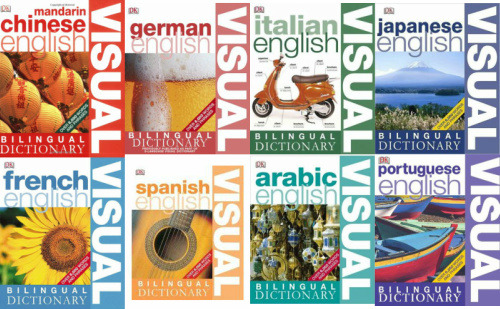
4. Ethnologue
These aren’t language “learning” materials, but rather they help me find new languages to learn. These are more for the linguistic lovers, since they catalog almost every living language in the world in every country, and provide language maps and statistics. There’s really fascinating stuff in those books, so I highly recommend purchasing them.
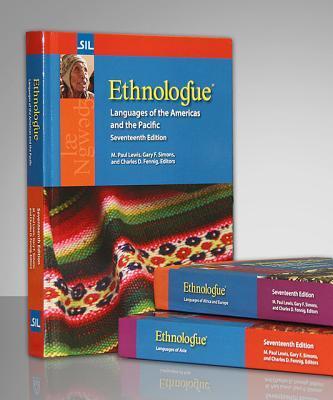
5. The “Dirty” books
So far, I have only used the Japanese version, however, I really like what the book includes, and it’s great for learning slang in your target language, and things that traditional textbooks wouldn’t teach you.

6. Living Language
I LOVE these books so much, I’ve used the Russian, Mandarin, and French ones and I’ve found them very helpful! The layout of these are very nice, and they’re pretty comprehensive.
7. Tuttle books
Tuttle offers several different language books, and they all are very good in my opinion. I have used their books for Arabic, Korean, Mandarin, Japanese, and Hindi.
That’s all that I have right now, but if you all would like more resources than I will definitely make a second one!
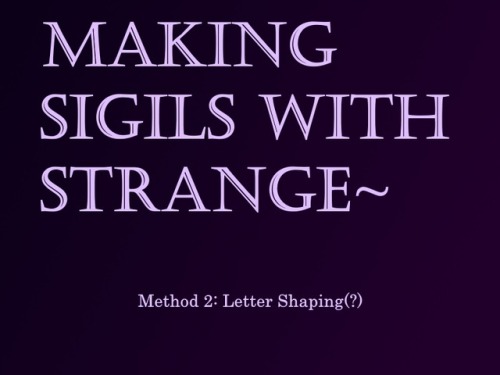


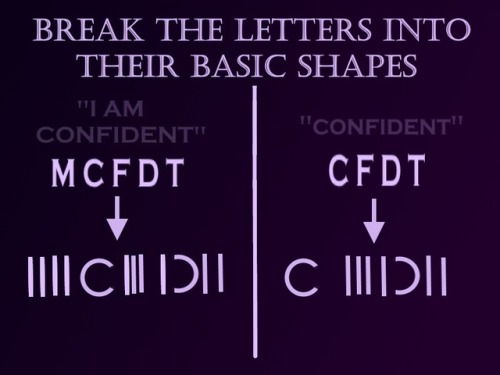


I don’t really know what people generally call this method of sigil making, so I’m just calling it “Letter Shaping” because you’re using the basic shapes from certain letters. This is the most common form of sigil making, and it allows the most creative influence. As you see above the sigils are for nearly the same thing, yet the sigils came out completely different. Not because the purpose was different, but because I approached them both a different creative way, and that’s what I like so much about this method. There’s a lot of freedom and personalization involved.
(UPDATE: Here’s a link to a guide on how to deconstruct letters down to basic shapes)





REFERENCE CONCEPTARTWORK!

Autunite - Nanjingqiao U deposit, Pingjiang Co., Yueyang Prefecture, Hunan Province, China




Early Medieval pattern-welded Sickle
Reconstruction by Thorkil
The sickle was based on an antler sickle case found in Stargard Szczecinski, West Pomerania (Poland). The original was richly decorated with geometrical motives, popular at that time. Thorkil’s version is a very faithful reconstruction of it, with all circles, dots, triangles and lines made on natural deer antler.
The decoration was hand engraved, then coloured with natural dark dye for a contrast and stronger effect. The sickle blade’s is pattern-welded (damascus) steel. It was hand forged (in charcoal fire) of 20 twisted layers. The cutting edge was forge-welded to pattern-welded part.
Source: Copyright © 2017 Thorkil
imagine if the oceans were replaced by forests and if you went into the forest the trees would get taller the deeper you went and there’d be thousands of undiscovered species and you could effectively walk across the ocean but the deeper you went, the darker it would be and the animals would get progressively scarier and more dangerous and instead of whales there’d be giant deer and just wow
Hello! I have a plan to get my main character injured by the antagonist. But, since the mc lives, is it better to describe the danger or get the mc injured so he (and the audience) would have no questions about the seriousness of the antagonist?
When to Injure Your MC
If you ask many writers why they beat their characters up so much, the immediate playful answer might be “Because it’s fun!” but there is (or should be) some strategy involved in when and how you injure your main character. So before I answer the question directly, I’m going to discuss these strategies a little.
Reasons to Injure a Character:
1. To create additional challenges in a high-stakes situation
If a character’s journey has been fairly easy to far, an injury is one way to complicate things. But the only way it works is if the injury lasts long enough to really hinder them.
For instance, if you have a character that has the magical ability to heal others, then a character being injured and then healed two minutes later doesn’t create much of a challenge, nor does it heighten suspense since the character’s life was never truly in danger. So an injury that’s introduced to complicate things should take some time to recover from, and it’s usually more realistic anyway, especially when you consider the tortuous stuff we do to our MCs sometimes.
However, if you do have a healer character, and they’re currently separated from the character you injure, then a challenge is immediately presented. The injured character has to continue their journey through the injury, to either reach their destination or be reunited with the healer that can help them.
2. To foreshadow a future situation
The situation I described above, where a character is injured and then healed two minutes later, could work, if it’s being used to foreshadow the second situation I described, where the two characters are separated. Showing the healer in action early in the story can foreshadow a later complication when the healer is unable to assist their companion, whether it’s due to a separation or a sudden loss of powers.
It can also work as exposition to show the way the healer’s power works.
3. To show the antagonist’s maliciousness
The anon above suggested they injure their character to show the antagonist means business, and that definitely qualifies as a good reason to injure a character.

See, when an antagonist hurts a character - and not just an MC, but anyone - they show that they don’t care who gets in their way. They want what they want, and in their opinion, the ends justifies the means. Even when a character isn’t necessarily in their way, and they do it for pleasure, it tells a reader a great deal about the antagonist’s psyche, and how far they’ll go to further their own agenda.
My only caution here is to be wary of how often you’re using this reason. Often times it becomes easy to justify an antagonist’s plan by saying “They’re evil and they enjoy torturing people.” But villains who are evil just for the pure enjoyment of it grow uninteresting and predictable quickly. So despite the pleasure they get out of hurting people, they must have some greater scheme in front of them. Some ultimate gain that they’re hoping to achieve. A combination of these two things can breed a fascinating antagonist.
4. To deepen a character bond or relationship
Injuries or illness are great opportunities to write a dynamic where one character is taking care of another, showing how close the two characters are, and how attentively they’ll care for the other. But this dynamic is most compelling when it’s a reversal, such as a little brother taking care of an older one, or when someone who the protagonist has built up to be invincible is suddenly sidelined and needs the protagonist’s help.
Like the previous reason, i would just be careful how frequently this occurs. Situations like these are more effective when they’re big, and they last long term, rather than several smaller instances where a character keeps getting hurt and cared for.
There may be other reasons out there to justify injuring a character that I haven’t thought of here, but I can surely tell you one reason not to:
Avoid injuring a character purely for the fun of it.
Now listen, what you do in your own private writing universe is your own business, and if you want to put your characters through hell because it’s fun, I commend you for finding so much joy in the process of writing and I encourage you to keep at it. But when it comes to finding an audience, and telling a cohesive, well-paced, well-plotted story, you gotta start considering each move you make as a writer, and ask yourself if each plot point needs to be there.
Back to the anon…
Now that I’ve gone into all this detail, let me get back to the specific question that the anon asked. Since the character ultimately lives, is it better to just show the possible danger, or to actually have the antagonist injure them to show they’re serious?
My answer to you would be that you could injure the character, since your reasoning falls within the reasons I listed here (reason #3), and it would be even better if it qualified for two reasons, such as delaying their progress to achieve their goal (reason #1) or repairing a strained relationship when a companion must take care of them (reason #4).
Your argument that the character lives (so why bother?) ignores the need for conflict in a story. Readers appreciate conflict, as long as there are logical reasons for it, and if you consider these reasons I discussed, you should be in great shape.
However, I think that you could show your antagonist’s malicious intentions without injuring the character, if you felt the injury would be too much for an already conflict-heavy plot. The antagonist might show anger/violence towards the people working for them (out of frustration), or even to innocent bystanders, or other minor characters whose fates we’re not as tied up in. So I think there are still options for you if you wanted to avoid an injury.
-Rebekah

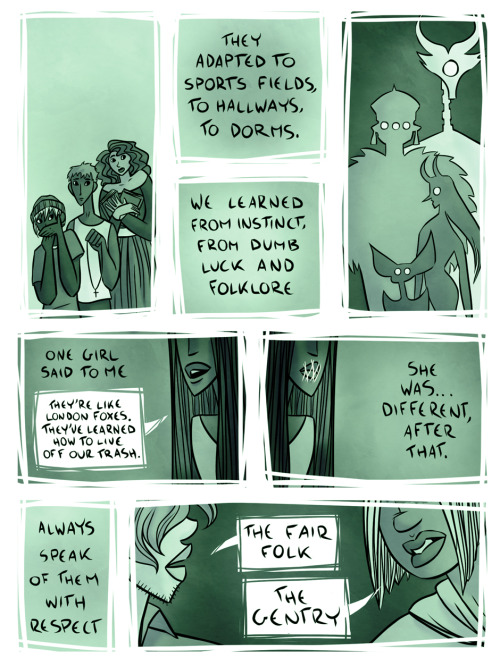
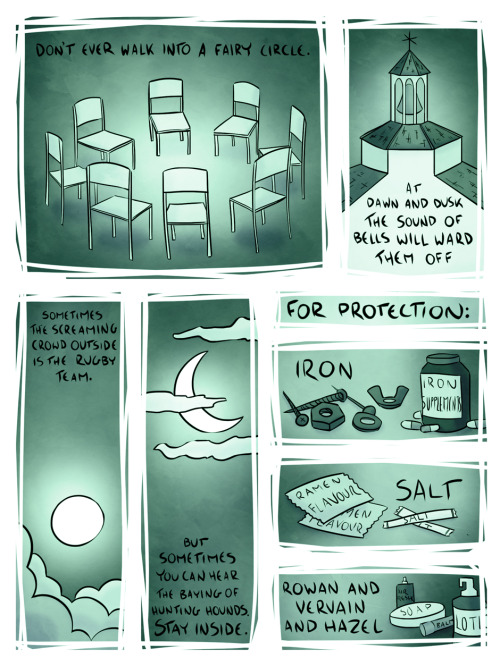



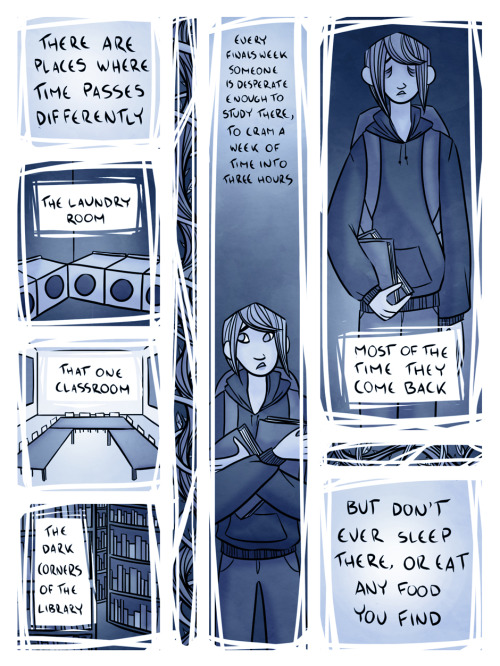

Coexisting With The Fair Folk Who Have Taken Up Residence In/Around/Beneath Your University: A How-To Guide
See more of my comics here, and my art here!
Whole bunch of lore/things I couldn’t fit/everything I love about the overlap in superstition and General College Weirdness below the cut-
Keep reading

“We wanted to create a language that is aesthetically interesting,” says production designer Patrice Vermette. “But it needed to be alien to our civilisation, alien to our technology, alien to everything our mind knows. When Louise first sees the language, you don’t want to give it away to the audience that it’s a language.”

Heinrichite
Ba(UO2)2(AsO4)2·10H2O
Locality:
Schmiedestollen dump, Wittichen, Schenkenzell, Black Forest, Baden-Württemberg, Germany
Field of View: 1.84 mm
Coll.& photo Ko Jansen










Solar System by Jian Guo on inprnt
See more illustration
So Super Awesome is also on Facebook, Pinterest and Instagram

Practical, not sexist or supposed-to-look-hot female armor which actually protects you.

Rhodochrosite - N`Chwaning Mines, Kuruman, Kalahari manganese field, Northern Cape Province, South Africa
Watch this specimen sparkle on video here, it’s gorgeous!!
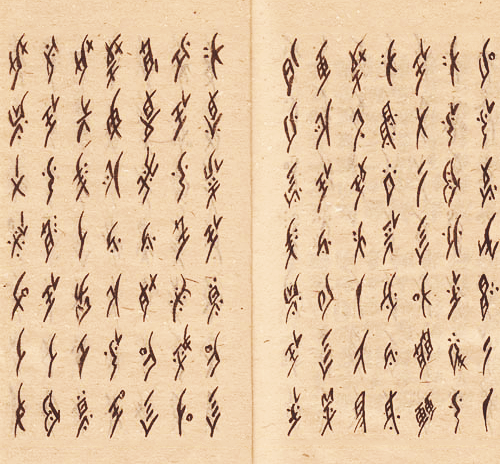
Nüshu (literally “women’s writing” in Chinese) is a syllabic script created and used exclusively by women in the Jiangyong County in Hunan province of southern China. Up until the late Qing Dynasty (1644-1912) women were forbidden access to formal education, and so Nüshu was developed in secrecy as a means to communicate. Since its discovery in 1982, Nüshu remains to be the only gender-specific writing system in the world. Read more here.










Phyllotaxy - the arrangement of leaves
Phyllotactic spirals form a distinctive class of patterns in nature, depicting the arrangement of leaves on a plant stem. The basic patterns are alternate, opposite, whorled or spiral, many of them arranged based on consecutive fibonacci numbers.
more on geometrymatters.com/archive









Dolce and Gabbana Alta Moda spring 2016 part 1





David Fleck - https://society6.com/fleck - http://fleck-tesseract.tumblr.com - https://www.facebook.com/FleckArt - https://www.kickstarter.com/projects/1623436576/celestial-cities
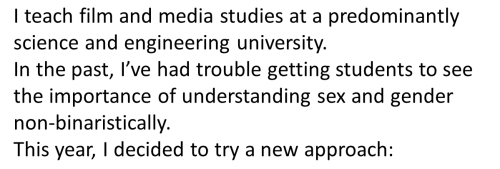
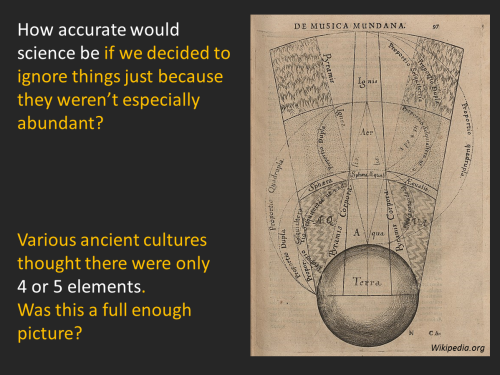


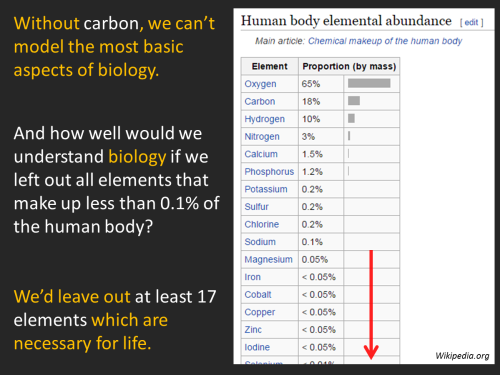
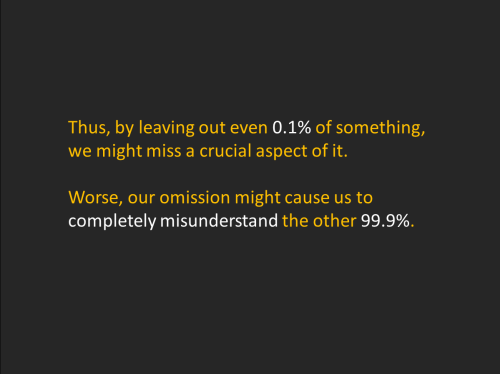
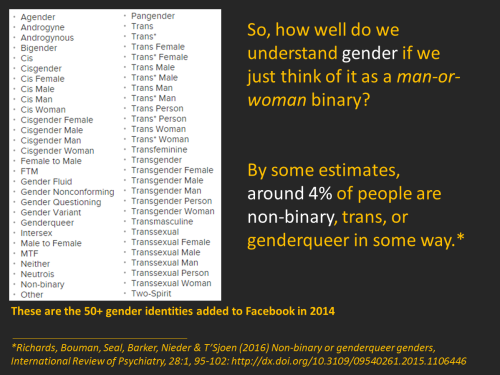


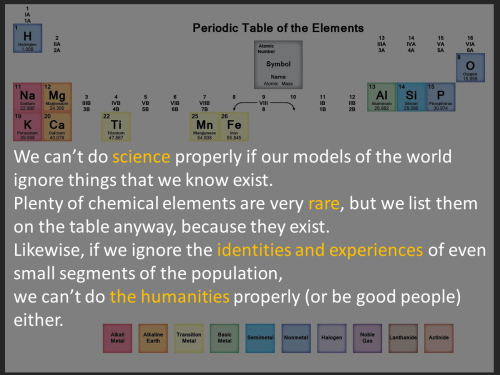
Saying that man and woman are the only genders is actually LESS nuanced than saying that earth, water, air, and fire are the only elements.

Vanadinite
Pb5(VO4)3Cl
Locality:
Old Yuma Mine (Yuma Mine), Saguaro National Monument, Amole District, Tucson Mts, Pima Co., Arizona, USA
Field of View: 5 mm
Natural History Museum Prague’s Photo
My Name Is Cow: Masterpost(?)
(The first few stanzas covered by i-ddpej here.)
my name is Cow, and wen its nite, or wen the moon is shiyning brite, and all the men haf gon to bed - i stay up late.
i lik the bred.
my name is Dog, and wen its tea, i hope they giv sum foode to me - i hope they shair befor its gon - they never do.
i dont get non.
my name is Cow, and this is tru - my caynine frend, its up to yu. so just be brayve and smart insted - and be like me.
i lik the bred.
(Bridge, dividing original content from fan content: First Of All How Dare You)
my name is Cat no cares have i be it sun or moone that lytes the sky by night i prowl by day i stretch i salute u, Cow
u bold old wretch
O clevr Cat Who roams the barn I promys you I men no harm As yor a friend With stelthy tred I invyte you
To lik sum bred.
I am the bred With yeast I ryse Mine amber crust Doth pleas thyn eys
The cow and cat Whos tongues delit Upon my crust Both noon and nite
Are easy stop’d By dor and slat Perhaps the baker Noes not that?




















